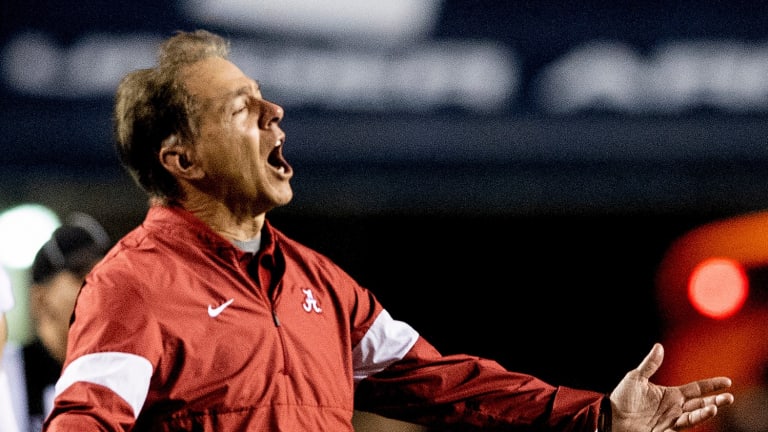
A JERSEY GUY: CFB Season Reaches 1st Crossroads

What do we have in college football this morning?
Let's see.
In the SEC, LSU and Florida and Vanderbilt and Missouri postponed games scheduled for Saturday, as did Baylor and Oklahoma State in the Big 12. In the American Athletic Conference, Cincinnati and Tulsa postponed Saturday's game.
Creating even more of a headline earlier this week was the news that Alabama football coach Nick Saban had tested positive for COVID-19, as did Crimson athletic director Greg Byrne.
More tests will be conducted throughout college football and the SEC on Friday, with the results determining whether there will be even more postponements in the next 24 hours.
It is mid-October, or in normal years (if there are any such things) the middle of college football season.
But 2020 will be called many things by historians, but normal WILL NOT be even mentioned.
The SEC will attempt to carry on this weekend, but Georgia at Alabama is very much a question mark right now.
A week from now, the Big Ten is scheduled to START its season.
The Pac-12 will start in the first week of November.
Not that any of this is a surprise.
When the SEC and its Power 5 brethren the ACC and Big 12 decided to fight their way through COVID-19 issues, rather than shut down, there was an understanding by almost everyone that this would not be a start to finish college football season without pauses.
Oh, there have been cancellations and suspensions of operations almost from the get-go.
Temple, of the American Athletic Conference, didn't begin its season until last week because of COVID issues.
North Carolina, North Carolina State and Notre Dame have had to suspend play because there weren't enough healthy (or quarantined) players available.
Head coaches such as Kevin Sumlin at Arizona and Mike Norvell at Florida State tested positive and had to temporary quarantine themselves.
Now Saban is at home—without symptoms—waiting for the next test results.
In typical Alabama efficiency mode, Saban simply left practice, went home and resumed his duties remotely using the technology available.
NCAA rules state that he will not be allowed to do any coaching from home on Saturday if the game against Georgia is played.
What is different about this season is that NO ONE knows what is next because these conditions have not existed in almost anyone's lifetime.
It's all new, so the contingency plans are being made based not on fact, but on guesses as to what might happen.
If Alabama vs. Georgia is postponed, the SEC has already said it will be rescheduled for Dec. 12, which sets up a potential Bama-Georgia back-to-back face off in the regular season and SEC championship game.
When the Power 5 conferences announced their new start-up plans in September they each had bye-weeks to give them wiggle weeks for rescheduling games.
Those openings are now shrinking rapidly, which means postponements will turn into cancellations and an uneven amount of games.
The ACC abandoned its two division format and has one 15-team league, with the championship game participants being decided by the two teams with the highest winning PERCENTAGE.
But what happens, for example, if team only plays 7 conference games and is 7-0, while its main competition finished with a 9-1 record.
7-0 beats 9-1 percentage wise, but what happens if the 7-0 doesn't include the 9-1 team?
And then there are the Pac-12 and Big Ten who will play truncated seasons. Should they even be considered for the playoffs.
Is a 7-0 Ohio State more worthy than a 9-1 Georgia or Alabama?
So many questions, so few answers available.